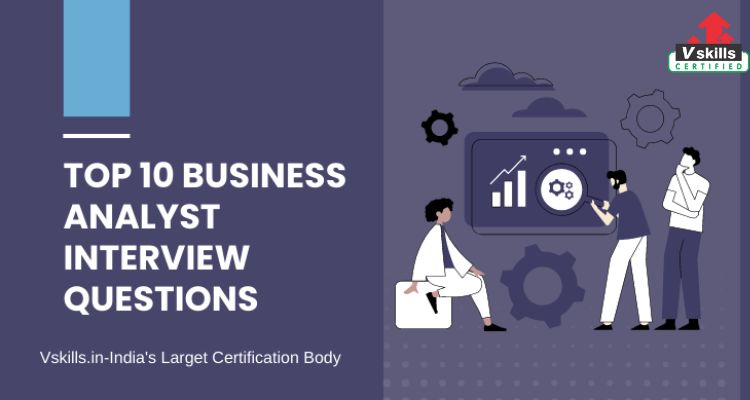Business analysis is the process of determining a company’s needs and locating answers to its issues. It entails assessing an organization’s current situation, determining its long-term goals and objectives, and then creating plans and suggestions to help it get there. Business analysts are specialists in this area who assist in bridging the communication gap between technical teams and business stakeholders. There is a growing need for qualified business analysts in today’s data-driven business environment. These experts can decipher complicated data, draw out insightful conclusions, and direct important decision-making procedures. Business analysts are essential in helping organisations navigate change and seize opportunities as industries continue to develop.
The role of a Business Analyst is indispensable in today’s business landscape, where technological advancements and market dynamics demand seamless collaboration between business and IT. By mastering the roles, responsibilities, and required skills of a Business Analyst, professionals can not only facilitate effective communication between stakeholders but also drive process improvement, innovation, and successful project delivery. As businesses continue to evolve, the Business Analyst remains a key player in ensuring organizations navigate change and capitalize on opportunities.
Before discussing the common interview questions let us first look at the roles, responsibilities and skills required of interested candidates.
Business Analyst Roles and Responsibilities
• Work alongside stakeholders to collect and document functional and non-functional business needs.
• Identify any bottlenecks in the current business processes and suggest ways to make them more effective and efficient.
• Gather and analyse data to derive important insights that guide business choices.
• assist in planning a project by defining the objectives, requirements, and scope.
• Analyse how changes may affect corporate systems and operations.
Business Analyst Skills Required
Analytical Thinking:
- The capacity to dissect difficult issues into smaller, more manageable parts and come up with workable answers.
Interpersonal and Communication Skills:
- Effective facilitation abilities to lead workshops, interviews, and discussions with stakeholders.
- The ability to listen intently in order to accurately interpret and record requirements.
Technical Proficiency:
- Familiarity with a range of tools and programmes, including the Microsoft Office Suite, tools for data analysis (Excel, SQL), and project management programmes (JIRA, Trello).
Domain Knowledge:
- The ability to effectively translate business needs into technological requirements requires a thorough awareness of the industry and domain in which the organisation works.
Problem-Solving:
- The ability to pinpoint the underlying causes of problems and create creative fixes that support corporate goals.
Flexibility:
- The capacity to adjust to changing circumstances and thrive in a fast-paced setting.
Collaboration:
- Talent that includes the ability to work cooperatively with cross-functional teams that include stakeholders, developers, testers, and project managers.
Critical Thinking:
- The ability to critically analyse information, weigh alternatives, and reach well-informed conclusions.
Documentation Skills:
- Creating concise, unambiguous documentation that effectively explains requirements and processes is one of your strongest suits.
Domain-Specific Competencies:
- Additional skills like financial analysis, healthcare legislation, or e-commerce trends may be necessary depending on the business.
Top 10 Frequently Asked Interview Questions for Business Analysts
Being a newcomer to the field of business analysis can be thrilling and difficult. It is crucial to be well-prepared for the interview process as you set out on this adventure. It is important for one to familiarize themselves with the type of questions an interviewer may ask. Mastering the art of business analysis interviews requires a combination of technical expertise, analytical prowess, and effective communication skills. We have constructed the following list of the top 10 often asked business analytics interview questions, along with advice on how to respond to them, to help aspiring candidates prepare effectively.
Question 1: Can you explain what business analytics is and its significance in modern business operations?
Answer: Begin by defining business analytics as the process of using data to drive decision-making and improve business performance. Highlight its role in uncovering patterns, trends, and insights from data to solve complex business problems and optimize processes. Mention real-world examples where business analytics led to substantial improvements.
Question 2: Walk me through the steps of the business analytics process.
Answer: Describe the typical stages: defining the problem, data collection and preparation, data analysis, interpretation of results, and decision-making. Emphasize the iterative nature of the process, where insights may lead to refining the problem or collecting more data.
Question 3:What programming languages and tools are you proficient in for business analytics?
Answer: Discuss your proficiency in popular programming languages like Python and R, and mention your familiarity with tools such as Excel, Tableau, Power BI, or SQL. Provide examples of how you have used these tools to analyse data and present findings effectively.
Question 4: Can you differentiate between descriptive, predictive, and prescriptive analytics?
Answer: Explain that descriptive analytics involves summarizing historical data, predictive analytics forecasts future outcomes, and prescriptive analytics suggests actions based on insights. Provide an example to illustrate each type, showcasing your understanding of their distinct purposes.
Question 5: How do you handle missing or incomplete data in your analysis?
Answer: Mention your approach to identifying missing data, including assessing the reasons for its absence. Discuss techniques like imputation, where you estimate missing values based on existing data patterns. Highlight your commitment to ensuring data integrity and the impact of your decisions on the analysis.
Question 6: Share an example of a business problem you solved using data analytics.
Answer: Narrate a specific instance where you used data analytics to solve a business challenge. Outline the problem, the data you analysed, the methods you employed, and the actionable insights you extracted. Highlight the positive outcomes resulting from your analysis.
Question 7. How Do You Communicate Complex Technical Concepts to Non-Technical Stakeholders?
Answer. Effective communication lies at the heart of a successful business analyst’s skill set. Describe your approach to breaking down complex technical concepts for stakeholders who lack a technical background. Communicating complex technical concepts to non-technical stakeholders requires a tailored approach. I begin by gauging the stakeholder’s familiarity with technical terms and concepts. To simplify the information, I employ analogies, relatable visuals, and straightforward language. My focus is on addressing the ‘why’ and ‘how’ aspects that align with their interests, ensuring that they not only grasp the concepts but also appreciate their significance in achieving business goals.
Question 8: Describe a time when you faced resistance while presenting your analytical findings and how you handled it.
Answer: Share a scenario where your findings were met with scepticism. Explain how you approached the situation by focusing on the data, using visualizations to illustrate your points, and communicating in a clear, non-technical manner. Highlight your ability to address concerns and gain buy-in from stakeholders.
Question 9: How do you stay updated with the latest trends and advancements in business analytics?
Answer: Discuss your engagement with online forums, blogs, industry publications, and attending relevant webinars or conferences. Highlight your enthusiasm for continuous learning and adapting new techniques to enhance your analytical skills.
Question 10: Describe a situation where you identified a process improvement opportunity.
Answer: Business Analysts are often expected to identify areas for improvement. Share a scenario where you recognized inefficiencies, proposed solutions, and contributed to positive changes.
It is important to note that these questions are not domain specific but rather to assess the candidate’s personality and problem-solving style. As a novice, navigating business analyst interviews can be rewarding and difficult. You can demonstrate your abilities, knowledge, and excitement for the position by putting some thought into your answers to these often-asked questions. Be sure to personalise your responses to reflect your experiences and to draw attention to your versatility, capacity for learning, and ability to make a valuable contribution in the fast-paced field of business analysis.
Prepare the answers to these questions, practise giving them, and most importantly, show that you can analyse critically, solve problems, and properly explain complicated ideas. Inevitably improve your chances of getting hired and making a significant contribution to the organization’s data-driven decision-making by displaying your business analytics knowledge.




